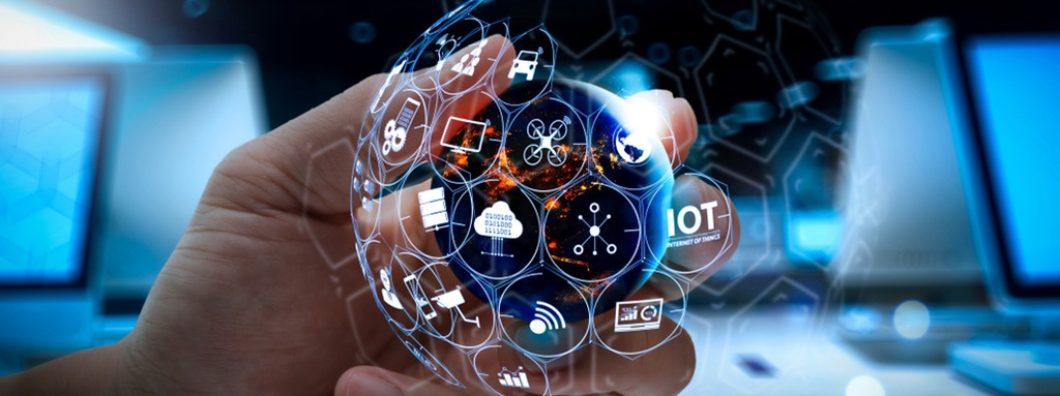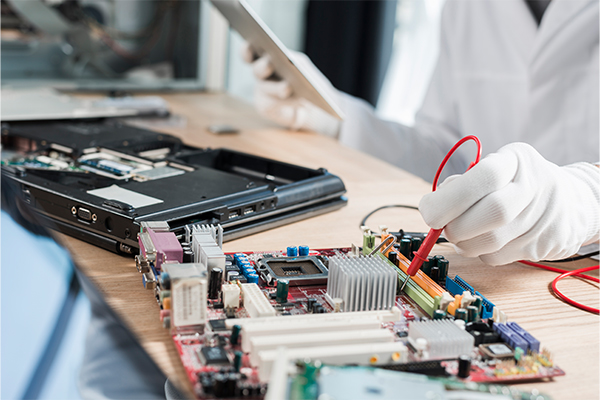
MTech (IoT) curriculum has been framed to prepare the students for the industry. More emphasis is given to hands-on training. As the Internet of Things is small, embedded energy-constrained nodes with sensors/actuators (things) networked with other devices through the internet, the curriculum focuses on Embedded Systems for developing the IoT things and Gateways, and the networking technologies required to interconnect the things over the internet. Further, the curriculum focuses on advanced signal processing, Artificial Intelligence techniques for data/signal analysis and VLSI techniques for designing high-performance digital hardware.
Curriculum Highlights
The few courses of the curriculum framed to equip the students for the industry are highlighted below: -
Embedded Programming: The course aims at providing hands-on Assembly and Embedded C programming with ARM Cortex Processors which are used more widely in the industry.
IoT Architecture and Protocols: The course is designed to introduce IoT Architecture and various protocols used for internetworking things. The course offers hands-on experience with wired /wireless connectivity protocols for things through Ethernet, Wi-Fi, and Bluetooth Low Energy (BLE). The students can learn many protocols like Zigbee, 6LoWPAN and CoAP used in IoT.
System On Chip (SoC) Design: The course is framed to give hands-on training on FPGA-based system design which is required for highly demanding/computationally intensive applications. The course also provides insight into Xilinx Zynq FPGA-based system design.
Machine Learning Techniques: The course gives the practical machine learning required for IoT Data Analytics. Needless to say, as IoT generates huge data, this course prepares students to master data analytics skills using machine learning.
Wireless Sensor Networks: As most small IoT things are connected through wireless means, this classic course teaches and offers hands-on sessions on designing and implementing various layer protocols for sensor networks.
Other courses: Smart Sensors and Actuators, Advanced Signal Processing and many advanced courses as electives.
Faculty
The ECE department has faculty having PhD from IITs, foreign universities and other universities of repute. A list of the ECE faculty and their profiles are given here
The faculty involved in conducting the courses for MTech in Internet of Things (IoT) and their area of expertise are given below:-
| SNO | Faculty Name | Designation | Research Areas |
|---|---|---|---|
| 1 | Dr Ramesh Vaddi | Associate Professor & HoD | Energy-Efficient Circuit Design with Post-CMOS Devices Hardware Security for IoT VLSI Accelerators and In-memory Computing Architectures for AI-based Edge Devices |
| 2 | Dr M Ramakrishnan | Associate Professor | Wireless sensor networks, Embedded Systems, |
| 3 | Dr Pradyut Kumar Sanki | Assistant Professor | Microelectronics & VLSI design Embedded System Design Image and Signal Processing |
| 4 | Dr Sunil Chinnadurai | Assistant Professor | Wireless communication systems/Signal Processing Information theory and channel coding Massive MIMO/NOMA/mm-wave/Internet of Things |
| 5 | Dr Sudhakar Tummala | Assistant Professor | Machine Learning & Deep Learning Medical Image Analysis Multimodal Big Data MRI |
| 6 | Dr Uday Shankar | Assistant Professor | Signal Processing for Advanced Wireless Communications Game theory, Machine Learning and Optimization |
| 7 | Dr E Karthikeyan | Assistant Professor | Signal Processing Machine Learning Higher order statistics |
| 8 | Dr V Sateeshkrishna Dhuli | Assistant Professor | Wireless Sensor Networks Internet of Things Mobile Communication Systems |
Lab infrastructure
IoT Lab
The Department has a dedicated IoT Lab having Rs 1.5 crore worth of equipment.
The Salient features of IoT Lab are: -
- 30 Desktop Computers with Intel i5 processor/16GB RAM/128GB SSD.
- STM32 IoT Discovery kits
- ESP32 Development boards
- LPC1768 (ARM Cortex M3) Microcontroller Development Boards
- Raspberry Pi 4 with 4GB RAM/32GB card -30 Nos
- Xilinx Zynq Development Boards
- NI LabView Signal Processing packages & SDR HW modules
- TI & Nordic wireless SoC Boards (Zigbee/Thread/6LoWPAN)
- Keysight Mixed signal oscilloscope (MSO3
- Keysight Spectrum Analyzer up to 7GHz
- Centralized Air-conditioned Lab
Embedded Lab
The Department has a dedicated Embedded Lab with Rs 25 Lakh worth of equipment.
The Salient features of Embedded Lab are: -
- 10 Desktop Computers with Intel i5 processor/16GB RAM/128GB SSD.
- Universal ESP32 Development Board
- STM32 Development Boards with touchscreen display.
- Alphabot2 – Raspberry Pi 4-based robotic platform with Vision.
- TI wireless SoC Boards & Sensor nodes (Zigbee/Thread/6LoWPAN)
- Rigol 200MHz Digital Signal Oscilloscope + 25MHz Arbitrary Waveform Generators
- Keysight High accuracy multimeters.
- Centralized Air-conditioned Lab
Industry Connect
The department conducts regular industrial talks delivered by domain experts from the industry. Industrial experts take some courses either by themselves or along with our faculty. After the first year of study, the students are encouraged to opt for the industrial internship for a maximum period of one year. Students who are interested in the internship need to attend the interview as and when the internship opening arises. Currently from 2021-23 batch students, 30% of students have undergone internships in various Industries leading to successful placements.
The Department also works closely with the industries which play a crucial part in curriculum development, delivery and other industrial training.

Placements

The MTech (IoT) students interested in the placements need to register with the Corporate Relations and Career Services (CRCS) office. The CR & CS department will offer the required placement-related training.
For MTech (IoT) first batch (2020-2022), 75% of the students got placed and for the second batch of MTech (IoT) students, 71% of students received job offers to date.
Few Projects Executed by Students:
- Multi-Channel MAC implementation for Wireless Sensor Networks
- Design and Development of IoT Based Embedded System for Continuous monitoring of Vital Signs
- Energy Neutral MAC Design for Wireless Sensor Networks with energy harvesting.
- Nano wire-based heterojunction photodetector modelling and analysing efficiency using Machine Learning
- Machine learning-based device simulation for the characteristics of NS-FET.
- Analysis of Perovskite solar cell by using machine learning.

